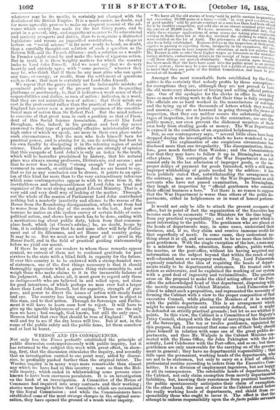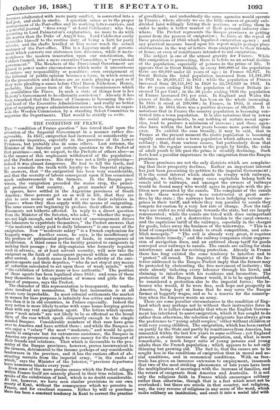WEEDON AND ITS CONSEQUENCES.
NOT only has the Times perfectly established the principle of public discussion contemporaneously with public inquiry, but it has returned to the subject this week with great effect, in show- ing, first, that the discussion stimulates the inquiry, and secondly that an investigation carried to one point may, aided by discus- sion, be profitably pushed further than the original intent. The Weedon inquiry is in many ways more remarkable than almost any which we have had in this country ; more so than the Mel- ville inquiry, which ended in whitewashing some persons since known to have been enormous peculators. It is an investigation on the back of an investigation. A Committee of the House of Commons had inquired into army contracts and their working ; stones were brought before that Committee which are reexamined by this Royal Commission ; and while the Commissioners have established some of the most strange charges in the original awn- nation, they have opened the ground of a much wider inquiry. NOT only has the Times perfectly established the principle of public discussion contemporaneously with public inquiry, but it has returned to the subject this week with great effect, in show- ing, first, that the discussion stimulates the inquiry, and secondly that an investigation carried to one point may, aided by discus- sion, be profitably pushed further than the original intent. The Weedon inquiry is in many ways more remarkable than almost any which we have had in this country ; more so than the Mel- ville inquiry, which ended in whitewashing some persons since known to have been enormous peculators. It is an investigation on the back of an investigation. A Committee of the House of Commons had inquired into army contracts and their working ; stones were brought before that Committee which are reexamined by this Royal Commission ; and while the Commissioners have established some of the most strange charges in the original awn- nation, they have opened the ground of a much wider inquiry. " We have all the old stories of boots sold by public auction in quantie not exceeding 10,000 pairs at a time,'—cloth in very good condition alea of good quality' sold by private contract at a sum less than had been offerendd for it by another competitor, and sold also at an almost nominal price and t, the extent of 20,000 yards. We have, moreover, the additional fact,tli while these strange applications of army stores are taking place regim at serving in India have not at this day received the clothing to which telie; were entitled on the 1st of April. The grievances of the contractors have also been fully established. Ruinous delays in the inspection of their goods-- caprice in passing or rejecting them, incapacity in the examiners, the era' ployment of persons in very responsible situations at such low salaries thai Mr. Turner is able to otter them higher wages as labourers in the manufac turing districts, embarrassing delays in the receipt of large sums of money- -all these things are proved abundantly. Such iteration upon iteration has been made that the facts have sunk into the public mind as an ancient rooted system ; there may be some danger lest a political party should aria to insist that they are parts of the British Constitution and must be pre'. served at all hazards."
Amongst the most remarkable facts established by the Cora. mittee is the certainty that nobody profits by those corruptions; for corruptions they are, although they are not proved to have the old mercenary character of buying and selling official patron- age. One of the apologies for the clerks in office is, that they have so much writing work to do that their time is fully occupied. The officials are so hard worked in the manufacture of red-tape and the tying up of the thousands of letters which they receive and answer' —they are so harassed in going through the forms of inspection, that they can neither secure the substantial advan- tages of inspection, nor do justice to the contractors nor save the public money, nor even prevent the dishonest members of their own body from stealing goods or money. The War Department is exposed in the condition of an organized helplessness.
But, as our contemporary says, " several little clues have been dropped during the investigation which we have wondered to see missed." The explanation of one suspicious circumstance has disclosed more than one irregularity. The disorganization, there- fore, goes much further than Weedon ; and the Commissioners fear that they may have to follow it up in Birmingham and in other places. The corruption of the War Department does not consist only in the lax admission of improper goods, or the im- proper delays of payment for goods furnished., with a still more
improper withholding of goods needed by the soldiers ; it has been publicly stated that, notwithstanding the arrangement to the contrary, men are admitted to the War Department as civil servants who have not passed examination. In Birmingham, they laugh at inspection by "official gentlemen who consider their official business a bore." Yet there is no reason to suppose that the War Department is worse than others of the public de- partments, either in helplessness or in want of honest perform- ance.
It would not only be idle to attack the present occupants of office, but in point of fact the organization of the Executive has become such as to exonerate "the Ministers for the time being" from any practical responsibility ; and this is the point which is most interesting to the public. The gentlemen who are placed at the heads of departments may, in some cases, understand their business, and, if so, they claim and receive immense credit for that superfluity of merit. In some cases they understand no- thing about it at all, and are assumed to he no more than intelli- gent gentlemen. With the single exception of the law, a man may be a minister for trade, education home affairs, public works, the marine, or the post-office without his having acquired any information on the subject beyond that within the reach of any well-educated man or newspaper reader. Nay, Lord Palmerston expressly combated the idea of requiring the heads of depart- ments really to be departmental statesmen. He treated such a notion as subversive, and he explained the working of our system with a good deal of ingenuity and verisimilitude. The question arose on the proposal to make the chief acting officer of the Post- office the acknowledged head of that department, dispensing with the merely ornamental Cabinet Minister. Lord Palmerston de- clined to admit such a proposition' and represented the necessity of forming the Cabinet with a view to the proper composition of that executive Council, while placing the Members of it in relation with the public departments. This is an arrangement which might be more completely and accurately defined, and it might be defended on strictly practical grounds ; but let us see whither it points. In this view, the Cabinet is a Committee of her Majesty's Privy Council, charged with the duty of carrying on the functions of the Sovereign. The ten or twelve gentlemen, appointed for this purpose find it convenient that some one of their body should place himself in relation with some one of the great public de- partments, and thus Mr. Walpole is the Cabinet Minister con- nected with the Home Office, Sir John. Pakington with the Ad- miralty, Lord Colchester with the Post-office, and so on; but these gentlemen are only answerable for the carrying on of the goverll-. inent in general ; they have no departmental responsibility ; th," falls upon the permanent, working heads of the departments, Vi.o are not to be statesmen, but only to carry on a kind of official, professional routine according to orders from the Executive Com- mittee. It is a division of employment ingenious, but not happy in all its consequences. The ostensible heads of departments, ill the Cabinet, not only claim exemption from merely departanenT liabilities, but, knowing their remoteness from praotiml businean: the public spontaneously anticipates their claim of exemptiore On the other hand, the men of straw in the Cabinet stand befoe. the really working heads of departments, and shield from sponsibility those who ought to incur it. The affect ias
servants
attempt to enforce responsibility upon the de facto public that the
becomes adulterated with mere party conflict, is converted into a i
bad jest, and ends n smoke. A question arises as to the proper management of the Post-office and its working letter-emiers, and a powerful journal "fires away" at Lord Colchester; who has, according to Lord Palmerston's explanation, no more to do with the matter than the Duke of Argyll has. Lord Colchester easily reconciles himself to the routine duty of being a butt for party attacks, and the shafts levelled at him never reach the actua manager of the Post-office. This is a Lapritan mode of govern- ment which converts our
m statesmen into dummies, while it meta-
morphoses the modern innovation upon our constitution, the Cabinet Council, into a mere executive Committee, a "provisional government." The Members of the Provisional Government are laced in power under circumstances which make it uneourteous to enforce any responsibility or penalties ; even arraignment at the tribunal of public opinion becomes a farce, in which counsel for the prosecution and defence are as much playing a part as if they were pleading a cause before Chief Baron Nicholson. Hence, probably, that jocose turn of the Weedon Commissioners which so scandalizes the Times. In such a state of things how is her Majesty's Government to be efficiently carried on ? Already it has been remarked that the House of Commons is becoming the vir- tual head of the Executive Administration ; and really no better plan of securing proper administration occurs to us, than to super- sede the Weedon Commission by a standing Select Committee to supervise the Departments. That would be strictly en suite.



























 Previous page
Previous page